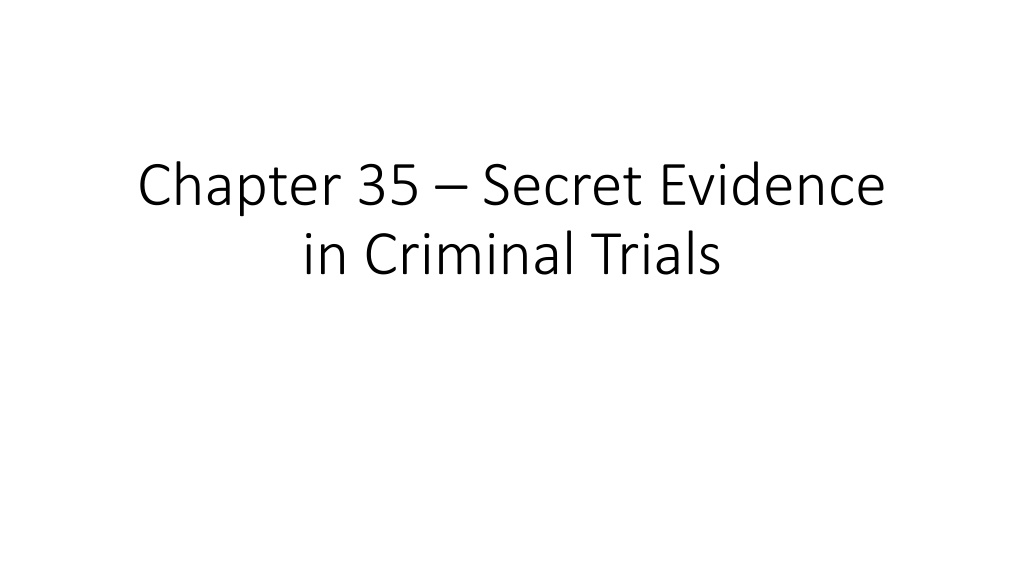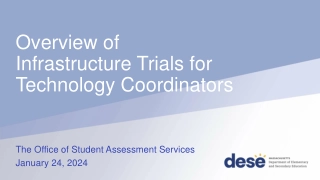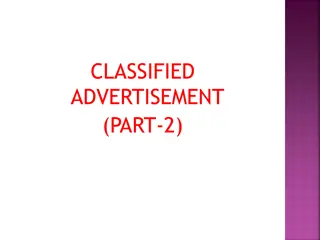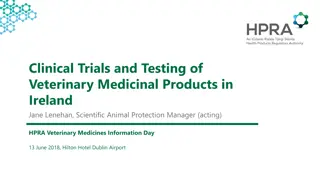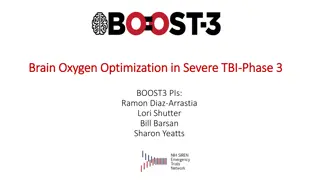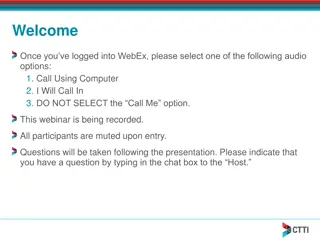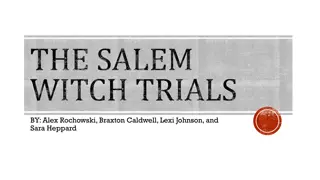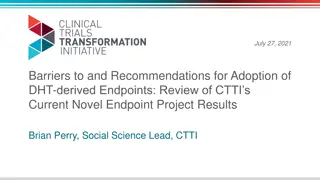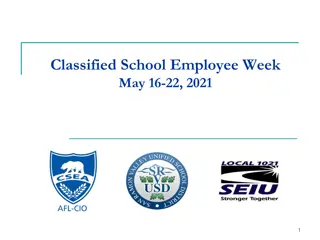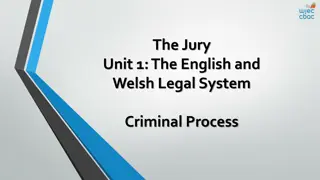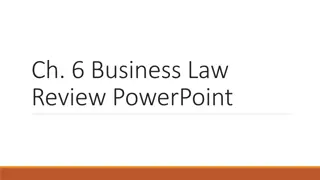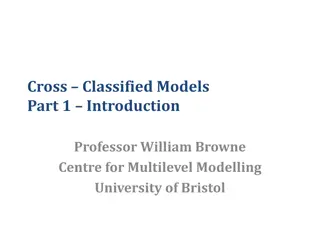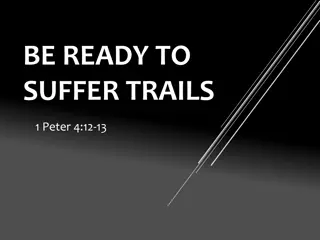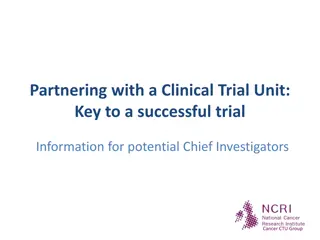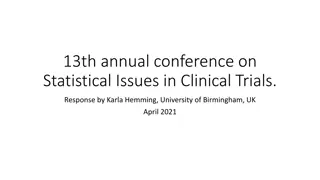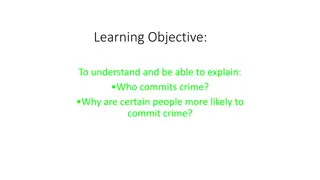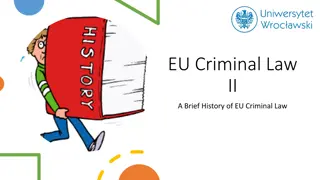Understanding the Role of Classified Information in Criminal Trials
In criminal trials, the handling of classified information is crucial and governed by specific rules. Defendants do not have an inherent right to access classified information, and there are procedures in place to determine its use in court. The rights surrounding secret evidence include protection against self-incrimination, the right to confront witnesses, and the right to a public trial. Discovery of classified information by defendants involves the court's authorization to handle such information during the discovery process. Defendants must also provide notice if they intend to disclose classified information during trial proceedings.
Download Presentation

Please find below an Image/Link to download the presentation.
The content on the website is provided AS IS for your information and personal use only. It may not be sold, licensed, or shared on other websites without obtaining consent from the author. Download presentation by click this link. If you encounter any issues during the download, it is possible that the publisher has removed the file from their server.
E N D
Presentation Transcript
Chapter 35 Secret Evidence in Criminal Trials
Classified Information Procedures Act Key This does not create a right for the defendant to have access to classified information. It only establishes the rules governing the use of the classified information in court. Access to the information is governed by Brady and the government s willingness to turn over the information. We previously discussed the government s option to withhold the evidence, with the consequence that in criminal cases the charges based on the evidence, or the entire case, would be dismissed. In civil cases against the government, where the plaintiff has the burden of going forward, the plaintiff s case will be dismissed if it depends on classified information that the government will not release.
The Rights At Issue with Secret Evidence Right against self-incrimination. This bars the use of coerced testimony, such as testimony obtained by torture. Right to confront and cross-examine witness and evidence. [T]he principal evil at which the Confrontation Clause was directed was the civil-law mode of criminal procedure, and particularly its use of ex parte examinations as evidence against the accused. Defendant s right to a public trial. The public s right to a public trial.
4. DISCOVERY OF CLASSIFIED INFORMATION BY DEFENDANTS The court, upon a sufficient showing, may authorize the United States to delete specified items of classified information from documents to be made available to the defendant through discovery under the Federal Rules of Criminal Procedure, to substitute a summary of the information for such classified documents, or to substitute a statement admitting relevant facts that the classified information would tend to prove. The court may permit the United States to make a request for such authorization in the form of a written statement to be inspected by the court alone. : :
5. NOTICE OF DEFENDANTS INTENTION TO DISCLOSE CLASSIFIED INFORMATION (a) Notice by defendant. If a defendant reasonably expects to disclose or to cause the disclosure of classified information in any manner in connection with any trial or pretrial proceeding involving the criminal prosecution of such defendant, the defendant shall, within the time specified by the court or, where no time is specified, within thirty days prior to trial, notify the attorney for the United States and the court in writing. Such notice shall include a brief description of the classified information. Whenever a defendant learns of additional classified information he reasonably expects to disclose at any such proceeding, he shall notify the attorney for the United States and the court in writing as soon as possible thereafter and shall include a brief description of the classified information. : : :
6. PROCEDURE FOR CASES INVOLVING CLASSIFIED INFORMATION: (a) Motion for hearing. Within the time specified by the court for the filing of a motion under this section, the United States may request the court to conduct a hearing to make all determinations concerning the use, relevance, or admissibility of classified information that would otherwise be made during the trial or pretrial proceeding. Upon such a request, the court shall conduct such a hearing. Any hearing held pursuant to this subsection (or any portion of such hearing specified in the request of the Attorney General) shall be held in camera if the Attorney General certifies to the court in such petition that a public proceeding may result in the disclosure of classified information. As to each item of classified information, the court shall set forth in writing the basis for its determination. Where the United States motion under this subsection is filed prior to the trial or pretrial proceeding, the court shall rule prior to the commencement of the relevant proceeding. 6
(b) Notice. (1) Before any hearing is conducted pursuant to a request by the United States under subsection (a), the United States shall provide the defendant with notice of the classified information that is at issue. Such notice shall identify the specific classified information at issue whenever that information previously has been made available to the defendant by the United States. When the United States has not previously made the information available to the defendant in connection with the case, the information may be described by generic category, in such form as the court may approve, rather than by identification of the specific information of concern to the United States. (2) Whenever the United States requests a hearing under subsection (a), the court, upon request of the defendant, may order the United States to provide the defendant, prior to trial, such details as to the portion of the indictment or information at issue in the hearing as are needed to give the defendant fair notice to prepare for the hearing. 7
(c) Alternative procedure for disclosure of classified information (c) Alternative procedure for disclosure of classified information (1) Upon any determination by the court authorizing the disclosure of specific classified information under the procedures established by this section, the United States may move that, in lieu of the disclosure of such specific classified information, the court order (A) the substitution for such classified information of a statement admitting relevant facts that the specific classified information would tend to prove; or (B) the substitution for such classified information of a summary of the specific classified information. The court shall grant such a motion of the United States if it finds that the statement or summary will provide the defendant with substantially the same ability to make his defense as would disclosure of the specific classified information. The court shall hold a hearing on any motion under this section. Any such hearing shall be held in camera at the request of the Attorney General. 8
(2) The United States may, in connection with a motion under paragraph (1), submit to the court an affidavit of the Attorney General certifying that disclosure of classified information would cause identifiable damage to the national security of the United States and explaining the basis for the classification of such information. If so requested by the United States, the court shall examine such affidavit in camera and ex parte.
(e) Prohibition on disclosure of classified information by defendant, relief for defendant when United States opposes disclosure (1) Whenever the court denies a motion by the United States that it issue an order under subsection (c) and the United States files with the court an affidavit of the Attorney General objecting to disclosure of the classified information at issue, the court shall order that the defendant not disclose or cause the disclosure of such information. 10
[Remedies for disallowing information] (2) Whenever a defendant is prevented by an order under paragraph (1) from disclosing or causing the disclosure of classified information, the court shall dismiss the indictment or information; except that, when the court determines that the interests of justice would not be served by dismissal of the indictment or information, the court shall order such other action, in lieu of dismissing the indictment or information, as the court determines is appropriate. Such action may include, but need not be limited to (A) dismissing specified counts of the indictment or information; (B) finding against the United States on any issue as to which the excluded classified information relates; or (C) striking or precluding all or part of the testimony of a witness.
United States v. Lee The Constitutionality of the CIPA 12
Defendants Privilege Against Self- Incrimination What does the defendant claim violates his privilege against self-Incrimination? Having to disclose potential testimony ahead of time. How does defendant argue that this limits his rights? He cannot stand silent and make strategic decisions on whether to testify. If he choses to stand silent, the prosecution still knows what evidence he would use. 13
Did the court accept this argument? CIPA does not require that a defendant specify whether or not he will testify or what he will testify about. Instead, CIPA requires merely a general disclosure as to what classified information the defense expects to use at trial, regardless of the witness or the document through which that information is to be revealed. What if the evidence will only come out through the defendant s testimony? What are examples of other forms of pre-testimony disclosures? alibi defense; insanity defense; public authority defense; medical and scientific tests, and tangible objects and certain documents. How could you distinguish these? None requires direct testimony to claim.
What about Fairness? [Is there a constitutional right to fairness?] Defendant also argues that the burdens placed upon him by CIPA unconstitutionally violate his Fifth Amendment rights in that they do not advance any interests related to the fairness and accuracy of the criminal trial. However, Defendant s argument is unconvincing. CIPA is designed to assure the fairness and reliability of the criminal trial while permitting the government to ascertain the potential damage to national security of proceeding with a given prosecution before trial. As the Supreme Court has noted, it is obvious and unarguable that no governmental interest is more compelling than the security of the Nation.
What does defendant have to do if he wants to cross-examine a witness on classified information? Defendant Lee next argues that 5 and 6 of CIPA violate his Sixth Amendment right to confront and cross-examine government witnesses by forcing him to notify the government pretrial (and explain the significance) of all the classified information he reasonably expects to elicit from prosecution witnesses on cross-examination and all such information that will be contained in defense counsel s questions to those witnesses. Because the only cited tactical disadvantage that may accrue, minimization of surprise, is slight, defendant has failed to demonstrate that the requirements under CIPA render his opportunity for cross-examination ineffective. 16
Defendants Due Process Claim Defendant claims that the burden of CIPA is one-sided. What are burdens on the government? Specifically, the government must provide the defense with any portions of any material it may use to establish the national defense element of any charges against Lee. Fourth, under 6(f), the government is required to provide notice of any evidence it will use to rebut classified information that the court permits the defense to use at trial. Finally, in addition to the discovery obligations under 6 of CIPA, the government must also comply with the Federal Rules of Criminal Procedure and Brady v. Maryland, 373 U.S. 83 (1963). [Is complying with the rules of criminal procedure really a balancing burden on the defense?] 17
What does the AG have to consider before starting a prosecution that involves classified information? Consequently, the Attorney General has instructed federal prosecutors, in deciding whether to prosecute, to weigh (a) the likelihood of such exposure, (b) the resulting damage to national security, (c) the likelihood of success if the case is brought, and (d) the nature and importance of other federal interests that prosecution would promote. 18
Can the Court look Behind the Classification of the Evidence? While there are situations under access statutes to government information that allow the court to look behind the classification claims, CIPA presumes that the information is legitimately classified.
Graymail Why does lack of access to information usually hurt the party with the burden of proof? If you sue the government, say for negligence under the Tort Claims Act for a plane crash, how can the government use the claim of secrets to thwart your case? Remember the problem of getting standing in surveillance cases because the government classifies the data so the plaintiffs cannot show a personalized injury? How can a defendant use demands for classified evidence be used to halt a prosecution? 20
Defendants Discovery in Criminal Cases What does Brady require the prosecution to provide the defense? evidence that is favorable to the defendant and is material either to guilt or to punishment. What does the Jencks Act require as regards witnesses? You have to produce their statements. Federal Rule of Criminal Procedure 16(a)(1)(A)-(B) permits criminal defendants to discover their own statements, as well as documents and tangible objects in the possession, custody, or control of the government that are material to the defendant s defense; are intended for use by government as evidence; or were obtained from or belong to the defendant. These apply to the prosecution. 21
What is the duty of intelligence agencies? What is the test? federal discovery obligations extend to those government agencies that are so closely aligned with the prosecution of a specific matter that justice requires their records be subject to the respective discovery obligations. Is there any effective way to know if the agencies have complied? Have agencies been caught lying? 22
CIPA and Discovery How can requiring defense counsel to get a security clearance allow the government to undermine the defense? Who decides? How long does it take? Does it make sense, given that the defendant gets to see the evidence? 23
CIPA: Disclose or Dismiss When the government refuses to allow classified evidence to be used, the court uses a Matthews balancing to decide whether the case should be dismissed. How can this undermine criminal due process rights? 24
10 silent witness Defendant s right to a public trial How does CIPA violate defendant s right to a public trial? Is this an absolute right? Can defendant waive the right or request a closed trial? What about the public s right? Next slide 25
The implications of a public trial Does the public see the same evidence that the jury sees? OJ trial What right does this support? Right of a public trial. Would we need to worry about classified evidence if we closed the trial? What about jurors? Who else is in the courtroom? Record for appeal? 26
(not in the book) Richmond Newspapers, Inc. v. Virginia, 448 U.S. 555 (1980) "[T]he presumption [of a public trials] may be overcome only by an overriding interest based on findings that closure is essential to preserve higher values, and is narrowly tailored to serve that interest. The interest is to be articulated along with findings specific enough that a reviewing court can determine whether the closure order was properly entered. What about when a child is testifying in a child sexual abuse case? What about when it will seriously affect the defendant s right to a fair trial perhaps in a preliminary hearing? Where would classified information come in? 27
Using the Silent Witness Rule to Preserve the Defendant s Rights and Protect the Information Under the rule, a party seeking to introduce a classified document would call a witness who could authenticate the document. While on the stand, the witness would not disclose the information from the classified document in open court. Instead, the witness would have a copy of the classified document before him. The court, counsel and the jury would also have copies of the classified document. The witness would refer to specific places in the document in response to questioning. The jury would then refer to the particular part of the document as the witness answered. By this method, the classified information would not be made public at trial but the [party] would be able to present that classified information to the jury. [United States v. Zettl, 835 F.2d 1059, 1063 (4th Cir. 1987).]
D. ACCESS TO SECRET EXCULPATORY TESTIMONY 29
United States v. Moussaoui [Zacarias Moussaoui was arrested before the 9/11 attacks, then later indicted for acts in connection with those attacks. The government sought the death penalty on several of these charges. Subsequently, Witness **** (asterisks are used by the court to indicate redacted material), a suspected member of al Qaeda, was captured by the United States. Moussaoui moved for access to Witness ****, asserting that the witness would be an important part of his defense. Ultimately, he sought access from two additional witnesses in U.S. custody. The government opposed these requests. 30
The legal issue What did the district court order when the government refused access to witnesses who might prove that defendant was not involved in the 9/11 attack, and thus should not get the death penalty? The district court rejected the government s proposed substitutions and again ordered deposition of the witnesses. When the government refused to comply with this order, the district court dismissed the death notice and prohibited the government from making any argument, or offering any evidence, suggesting that the defendant had any involvement in, or knowledge of, the September 11 attacks. 31
The Witnesses Were the witnesses in the government s control? Yes What writs could the court issue to force them to be produced and be allowed to testify? a writ of habeas corpus ad testificandum ( testimonial writ ) to the witnesses custodian Which executive power did the government claim was infringed? Executive s warmaking authority, in violation of separation of powers principles. 32
Did the court accept this claim? if there is a separation of powers problem at all, it arises only from the burden the actions of the district court place on the Executive s performance of its duties. What did the government claim as its burden? The Government alleges and we accept as true that **** the enemy combatant witnesses is critical to the ongoing effort to combat terrorism by al Qaeda. 33
When does the compulsory process right attach? Rather, a defendant must demonstrate that the witness he desires to have produced would testify in his favor. Why is this critical to avoid graymail in national security cases? Will defendant be able to depose or talk to the witnesses? No What must he rely on? Summaries of testimony provided by the government. 34
What did the district court find about the potential witness testimony? The district court did not err in concluding that Witness **** could offer material evidence on Moussaoui s behalf. **** Several statements by Witness **** tend to exculpate Moussaoui. 35
Having found this, what is the usual course for the court? Ultimately, as these cases make clear, the appropriate procedure is for the district court to order production of the evidence or witness and leave to the Government the choice of whether to comply with that order. If the government refuses to produce the information at issue as it may properly do the result is ordinarily dismissal. Why do you think the appeal court did not stop at this point and uphold the district court? And let a 9/11 plotter, the only live one, avoid the death penalty? 36
How did the court solve the problem? A similar approach is appropriate here. Under such an approach, the first question is whether there is any appropriate substitution for the witnesses testimony. Because we conclude, for the reasons set forth below, that appropriate substitutions are available, we need not consider any other remedy. 37
No Punitive Sanction. Why not hold the government in contempt for not producing the witnesses? It has the right to not produce them, the court has other remedies. 38
Deciding a Clash Between Branches: Formalism or Balancing? If the executive sees this as an impermissible intrusion into warmaking, what is its option? Do not prosecute Should the executive be able to use the courts, while limiting their ability to provide constitutional protections? 39
Switching Forums? This could be simplified in a military commission, with a jury of military officers with security clearances, but only if there is no right of public access and no jury in the traditional sense. 40
Guilty Plea and Sentence. On April 22, 2005, Moussaoui surprised everyone by pleading guilty to the key charges against him, while at the same time denying having any intention to commit mass murder. He was subsequently sentenced to life in prison. 41
DO WE NEED A NATIONAL SECURITY COURT? Are there other areas where the courts do not work well? Science and tech? The military commissions were intended for this for non-US terrorists, but failed because of their slipshod implementation. How have we handled this in other contexts? Administrative tribunals 42
Why not administrative tribunals for national security cases? Would they be more fair, on balance? Could they be constitutional? Could they use a mental health/communicable disease model to detain the dangerous? Is this what Guantanamo has become? 43
